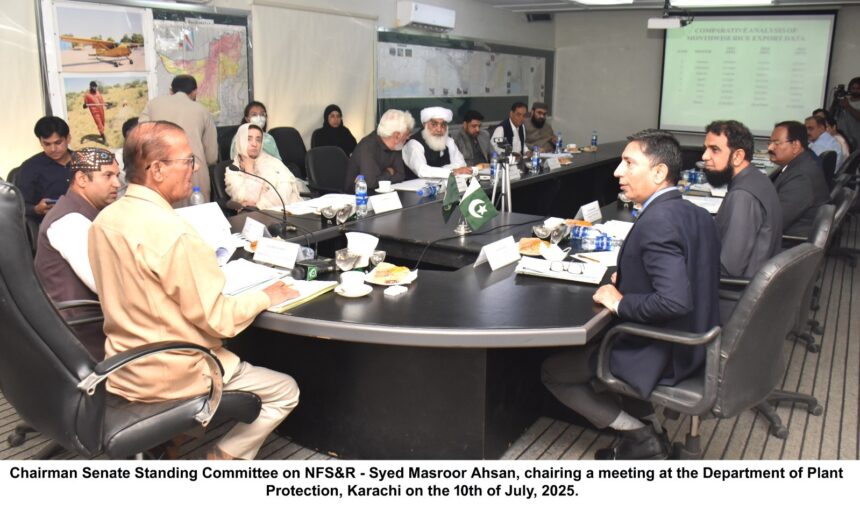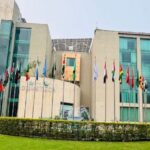The Senate Standing Committee on National Food Security and Research, chaired by Senator Syed Masroor Ahsan, visited the Department of Plant Protection (DPP) headquarters in Karachi to evaluate recent improvements in sanitary and phytosanitary (SPS) compliance aimed at reducing pesticide residue violations in agricultural exports. Following directives from Prime Minister Shahbaz Sharif to tackle compliance issues, significant progress has already been made—reflected in a substantial decline in export rejections, particularly for rice. Nonetheless, the committee identified ongoing concerns related to maize and mango exports and highlighted the urgent need for improved leadership, oversight, and transparency.
During the visit, senior officials from the DPP, including Director General Mr. Tahir Abbas, Deputy Director Quarantine Dr. Muhammad Ishfaque, and Director Quarantine Mr. Muhammad Basit, briefed committee members in detail about the steps taken to align Pakistan’s export standards with international food safety and plant protection protocols. The Prime Minister’s directives, issued in December 2024, stressed stringent monitoring, legal accountability for negligent officials, and immediate establishment of testing laboratories for pesticide residue.
These measures have resulted in tangible progress, especially in rice exports. Previously, Pakistani rice consignments repeatedly faced interceptions by European Union authorities due to exceeding Maximum Residue Limits (MRL) as well as aflatoxin contamination. After 61 EU interceptions in 2023, the number rose significantly to 106 interceptions in 2024—with 73 incidents directly relating to pesticide residues. However, intensified inspections, enhanced exporter awareness campaigns, and improved coordination between DPP personnel, provincial authorities, and the private sector have sharply reduced interceptions in the current year to only 30, comprising just 13 instances relating to MRL violations and 15 involving aflatoxins. The primary responsible pesticides identified included Acetamiprid, Chlorpyrifos, Imidacloprid, and Thiamethoxam.
The committee also reviewed DPP interventions in maize exports, Pakistan’s third key food grain crop, typically yielding 10.634 million tons annually. Although maize exports reached 1.837 million metric tons in the year 2023–2024, they suffered a drastic downturn in 2024–25, falling to just over 786,000 metric tons. Factors contributing to this sharp decline included high domestic grain prices and persistent phytosanitary concerns raised by international importers, particularly Vietnam. Vietnamese authorities reported 72 interceptions, mainly due to infestation by the khapra beetle (*Trogoderma granarium*), resulting in three formal warnings. In response, the DPP enacted a two-week temporary export ban, suspended accountable fumigation operators, initiated the registration of 63 compliant storage facilities, implemented new traceability procedures, and established pest-specific standard operating protocols (SOPs). Additionally, tighter inspection regimes and a ban on the use of infested jute bags were enforced vigorously.
Turning its attention to mango exports targeting premium markets—such as Japan, Korea, and the United States—the committee noted serious challenges regarding required quarantine treatments including Hot Water Treatment (HWT) and Vapor Heat Treatment. While the DPP had introduced SOPs along with CCTV camera monitoring, Chairman Masroor Ahsan raised concerns over reported irregularities. Exporters alleged malfunctioning surveillance cameras, non-operational treatment facilities, preferential treatment given to some exporters, and corruption within DPP operations—including claims of officials illegally accepting payments per kilogram to skip mandatory procedures. One notable exporter saw mango shipments drastically decline from 40,000 kilograms previously to only 7,000 kilograms in the current exporting season, attributing such losses to inconsistent enforcement and unfair practices.
In response to these ongoing operational challenges, the committee underscored the immediate necessity to appoint a qualified, permanent Director General at DPP. Emphasizing that such a strategic appointment must ideally hold advanced degrees in plant protection or entomology, the Chairman noted the importance of technical leadership in sustaining and further advancing the recent gains in export compliance.
The committee also restated strong support for broader structural reforms, such as initiating the establishment of the National Food Safety, Animal and Plant Health Regulatory Authority (NAFSA), releasing necessary funds for new pesticide residue and phytosanitary laboratories, amending fumigation regulations to reflect contemporary needs, and enhancing provincial coordination. Continuous capacity-building workshops and farmer awareness programs were also positively evaluated.
Chairman Ahsan concluded the session recognizing the tangible benefits brought by the Prime Minister’s reform initiatives. He urged continued government backing, institutional accountability, and scientific oversight, stressing that Pakistan’s reputational recovery and competitiveness in international agricultural markets depend upon sustained, transparent actions and professional leadership.
The meeting was attended by Senators Rahat Jamali, Dost Muhammad Khan, and Abdul Wasay. Nevertheless, the members expressed considerable dissatisfaction regarding the absence of representatives from the Ministry of National Food Security & Research. The committee directed official correspondence to be sent to the Chairman Senate, requesting suitable action against absentee officials and reaffirming full ministerial cooperation as crucial for national interests.











